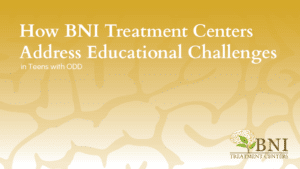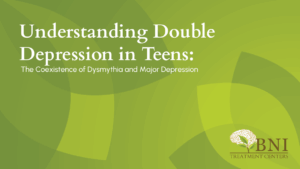What is ADD Like For Teens?
If your teen appears to lack focus, seems easily distracted, and struggles with school they may have a disorder called ADHD. Keep reading to learn what the signs of ADD in a teenager look like.
Teens with attention deficit disorder (ADD), also called inattentive-type ADHD, may at first seem to be just a bit distracted. In fact, ADD in teens is often missed because it lacks the more obvious signs of hyperactivity.
Because of the symptoms, the area of life most impacted by teenage ADD is their school life. These teens struggle academically because of this disorder. Learning what the signs of ADD in a teenager are can help parents get timely help for their child. Read on!
What is ADD versus ADHD?
Many people still use the terms ADD and ADHD interchangeably. In recent years, though, most kids, teens, and adults with an attention disorder are classified as ADHD. Among those with this diagnosis, there are features. What was once referred to as ADD is now called ADHD, inattentive type, or ADHD without the hyperactivity feature.
This simply means that most of the symptoms are the same, with the main difference being a lack of the features of hyperactive behaviors. Those with ADHD, inattentive type, struggle mostly with staying focused, concentrating, and completing tasks.
ADHD, either type, affects about 6%-7% of kids under the age of 18 and impacts nearly three times as many boys than girls. Roughly 3% of them will then carry the ADHD into adulthood.
What Are the Signs of ADD in a Teenager?
Without the symptoms associated with hyperactive behaviors, teens with ADD may seem to be lazy daydreamers. They aren’t disruptive like the classic ADHD diagnosis, so they may appear to have their heads off in the clouds. Here are the signs of ADD in a teenager:
- Easily bored.
- Relationship problems.
- Declining grades.
- Impulsive behaviors.
- Restlessness
- Makes careless mistakes.
- Low achievers
- Gives up on tasks, doesn’t complete schoolwork.
- Difficulty in test taking.
- Struggles to follow instructions.
- Disorganized; trouble prioritizing tasks.
- Loses things.
- Substance abuse.
- Sexually active at an early age.
Teens that struggle with ADD or ADHD often have a co-occurring mental health challenge. This might be a learning disability, depression, anxiety, conduct disorder, or oppositional defiant disorder.
4 Ways Teens Can Better Manage ADD
While ADD may present some challenges to a teen, there are some actions that can help improve functioning. These include:
- Exercise. Movement and exercise are very helpful for teens with ADHD. Exercise causes the body to release endorphins, which can ignite the executive functions in the brain. This region of the brain helps regulate mood, decision-making, impulsivity, and memory.
- Healthy diet. Eating healthy foods can enhance overall wellness and provide the teen with important nutrients for optimum brain health. A diet is rich in omega-3 fatty acids, lean proteins, nuts, seeds, legumes, whole grains, vegetables, and fruits.
- Stay organized. Teens can reduce the stress of staying on top of their schoolwork by using tools that help them stay organized. These might include making simple ‘to-do’ lists to using organizing tools like smartphone apps.
- Manage stress. ADD can be stressful for a teen, so it helps to learn ways to reduce stress and anxiety. It is useful to have a couple of stress reduction techniques handy that can be used as needed. Deep breathing, mindfulness, and guided meditation are good examples of these.
Ways Parents Can Help Their ADD Teen
Parents may not know which way to turn with it comes to their ADHD or ADD teen. They want to help their child cope better, especially at school, but may not know how to do that.
Parents can provide support for their teens by trying these tips:
- Provide Structure. It helps when parents can create a calm, stable routine at home. This helps the teen adopt a regular schedule for waking and going to bed, meal times and study time.
- Be patient. As hard as it might be to parent a teen with ADHD, try to remind yourself that they are struggling. They didn’t ask to have this disorder. Remember that they are frustrated too.
- Provide tools. To help the teen stay up on their appointments and assignments, parents should provide them with the needed tools. Get them a planner, or help them download an organizer app on their smartphone.
- Praise them. Set clear expectations, and when the teen does comply and complete their homework, be sure to praise them for it. These small successes should be noticed and complimented.
- Hire a tutor. If your teen is struggling with a certain subject, go ahead and hire a tutor to help them get up to speed.
- Create a contract. Teens with ADHD benefit from having concrete limits that are written down. Making a contract with your teen helps them better adhere to your rules, and helps them with decision-making. Include the consequences for breaking the rules.
- Encourage healthy habits. Brain function is better when teens limit junk food, sweets, and fast food, engage in exercise and get enough sleep.
- Be available. More than all else, your teen needs to know they can come to you when they feel overwhelmed or stressed. Be there for them, and let them know you always will be.
Expert Treatment for Teens with ADD
Teens with ADHD will benefit from therapy and medication. CBT teaches teen how to modify their behaviors by making better choices. Drugs such as Ritalin or Vyvanse can be helpful in reducing the symptoms of inattention. Healthy habits can amplify the improved brain functioning achieve through medication and therapy.
For teens who have co-occurring mental health disorders, there may be a need for a more intensive treatment approach. If this is the case, a residential treatment program for teens with ADD can provide this level of care.
BNI Treatment Centers Provides Help for Teens with ADD or ADHD
BNI Treatment Centers provides teen-centered treatment for mental health disorders, including conditions like ADHD. If you have any questions about our residential program, please call us today at (888) 522-1504.




